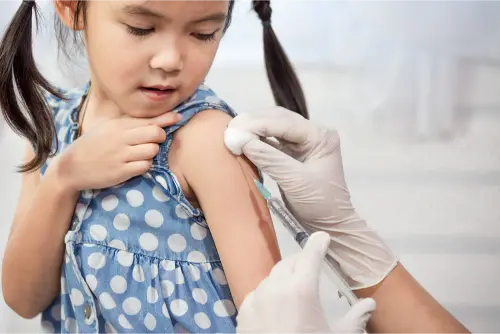In the realm of public health, few interventions have proven as effective and transformative as childhood immunizations. These tiny injections carry profound significance, serving as shields against an array of infectious diseases that once wreaked havoc on communities worldwide. Yet, despite their undeniable importance, the topic of childhood immunizations remains a subject of debate and misconception in some quarters. In this blog, we delve into the significance of childhood immunizations, exploring their immense benefits and dispelling common myths.
1. Shielding the Vulnerable:
Childhood immunizations serve as the frontline defense against a multitude of infectious diseases, ranging from measles and polio to diphtheria and tetanus. The immunity conferred by vaccines not only protects vaccinated individuals but also fosters community immunity, safeguarding those who cannot be vaccinated due to medical reasons or age, such as newborns and individuals with compromised immune systems. By reducing the transmission of infectious agents, immunizations play a pivotal role in preventing disease outbreaks and preserving public health.
2. Preventing Disease Burden:
The impact of childhood immunizations extends far beyond individual protection. Vaccination programs have been instrumental in reducing the global burden of disease, preventing millions of deaths each year and averting untold suffering and disability. Diseases that were once widespread, causing significant morbidity and mortality, have been brought under control or eliminated altogether through concerted vaccination efforts. For instance, smallpox, one of the deadliest diseases in history, was eradicated globally in 1980, thanks to widespread vaccination campaigns.
3. Long-Term Health Benefits:
Immunizations not only save lives in the short term but also confer long-term health benefits. By preventing infectious diseases during childhood, vaccines help lay the foundation for a healthier adulthood, reducing the risk of chronic conditions and complications later in life. For example, the measles vaccine not only prevents acute illness but also reduces the risk of long-term complications such as pneumonia, encephalitis, and vision loss. Similarly, vaccines against human papillomavirus (HPV) can significantly reduce the incidence of cervical and other cancers associated with HPV infection.
4. Economic and Social Impact:
The benefits of childhood immunizations extend beyond healthcare outcomes, encompassing economic and social dimensions as well. Vaccination programs save billions of dollars in healthcare costs and productivity losses by preventing illness, hospitalizations, and disability. Moreover, immunizations contribute to societal well-being by enabling children to attend school regularly, reducing parental absenteeism from work, and fostering community cohesion by preventing disease outbreaks.
Dispelling Myths and Misconceptions:
Despite overwhelming evidence supporting the safety and efficacy of vaccines, misinformation and misconceptions persist in some circles. From unfounded concerns about vaccine ingredients to myths surrounding vaccine side effects, misinformation can erode public confidence in immunization programs and undermine their effectiveness. It is essential to address these misconceptions through education, transparency, and evidence-based communication, empowering individuals to make informed decisions about their health and the health of their children.
Childhood immunizations represent one of the most significant achievements in modern medicine, offering protection against a host of infectious diseases and saving countless lives worldwide. From eradicating deadly pathogens to preventing disease outbreaks and reducing long-term health complications, vaccines are indispensable tools in the arsenal of public health. As we navigate the complexities of healthcare in the 21st century, let us reaffirm our commitment to immunization programs, ensuring that every child receives the protection they need to thrive and that communities remain resilient in the face of infectious threats. Together, let us safeguard tomorrow through the power of childhood immunizations.

